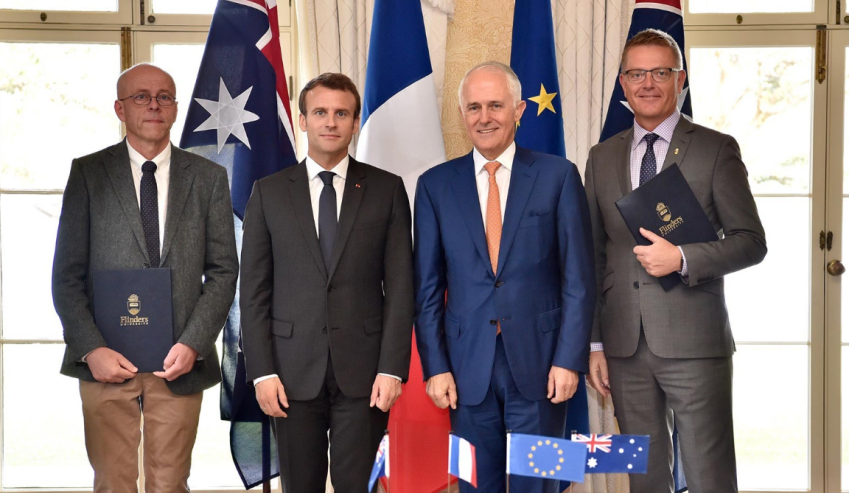South Australia's Flinders University will collaborate with France's Centrale Nantes on research projects exploring additive manufacturing, naval hydrodynamics and simulator development.
The announcement of the agreement took place in Sydney at a ceremony attended by French President Emmanuel Macron and Australian Prime Minister Malcolm Turnbull.
Researchers from Flinders Centre for NanoScale, Science and Technology and Centre for Maritime Engineering, Control and Imaging will be joining Centrale Nantes’ world-leading researchers for two key projects.
The first project involves marine propellers, and will investigate the use of nanocomposite technologies for manufacturing marine propellers to increase blade strength and reduce noise and corrosion as well as reducing manufacturing costs associated with existing metal fabrication technologies. The project will develop experimental models to explore the feasibility of manufacturing “smart” composites with embedded sensors to monitor performance and assure structural integrity.
The second project relates to 3D printing of metal-polymer composite materials. The field of additive manufacturing is still in its early days and there are still many challenges to research ahead of its widespread adoption. The newly formed Centrale Nantes-Flinders University research team will work together to scope and understand the challenges in 3D printing of metallic and composite materials, with the work of the investigative team researchers being at the forefront of additive manufacturing development.
Professor Arnaud Poitou, director of Centrale Nantes said the collaboration promises to advance global understanding in the field of marine technology.
"Centrale Nantes is pleased to welcome Flinders University to join our world-leading researchers in Nantes. The research teams at Flinders will further enhance our efforts in this area to assist in developing the maritime technologies of the future," Professor Poitou said.
Flinders University’s Vice-Chancellor Professor Colin Stirling thanked Centrale Nantes for the opportunity to collaborate with Centrale Nantes research teams.
"Flinders University welcomes the opportunity to share its defence research expertise on the international stage, and grow its relationship with Centrale Nantes to make a positive difference to an accelerating global industry," Professor Stirling said.
Flinders University has also signed a Memorandum of Understanding (MoU) with Thales and France's graduate and post-graduate engineering school ENSTA Bretagne that aims to deepen and extend well established research linkages between Australia and France in order to contribute to the future submarine program in Australia.
Discussions between Thales, Flinders University and ENSTA Bretagne have already identified two topics for research collaboration; one to design a demonstrator for the automatic connection of electro-optical links in a maritime environment and the second for the development of USV test vehicles suitable to test autonomy algorithms on robotic swarms at sea.









